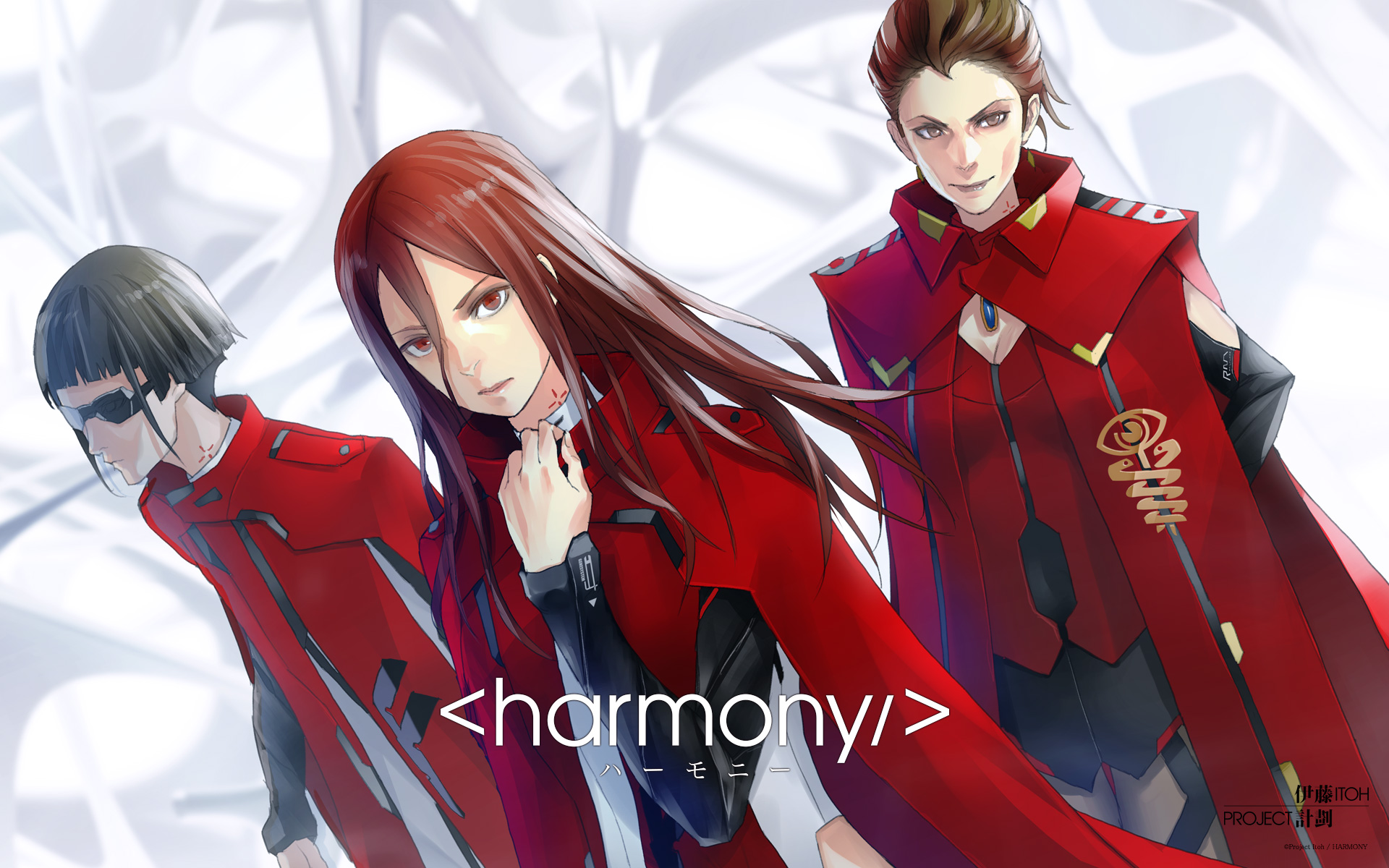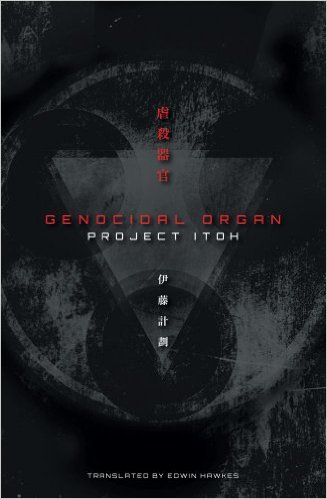Project Itoh: Books in Review
February 2, 2016 · 0 comments
Raz Greenberg examines Harmony and Genocidal Organ
 Japanese science fiction novelist Satoshi Ito, better known by his professional name Project Itoh, had a tragically short career. He published his acclaimed debut novel, Genocidal Organ, in 2007, followed by a novelization of the fourth Metal Gear Solid video game in 2008 and another original title, the dystopian novel Harmony in the same year – all while battling cancer, which finally claimed his life in 2009. Another novel which Itoh began working on before passing away, Empire of Corpses, was finished and published posthumously.
Japanese science fiction novelist Satoshi Ito, better known by his professional name Project Itoh, had a tragically short career. He published his acclaimed debut novel, Genocidal Organ, in 2007, followed by a novelization of the fourth Metal Gear Solid video game in 2008 and another original title, the dystopian novel Harmony in the same year – all while battling cancer, which finally claimed his life in 2009. Another novel which Itoh began working on before passing away, Empire of Corpses, was finished and published posthumously.
Even this small bibliography was enough to gain Itoh wide recognition, and his novels regularly poll as some of the best that Japanese literary science fiction has to offer. The concluding months of 2015 were supposed to be a grand celebration of Itoh’s work, with the release of three feature-length animated adaptations of Empire of Corpses, Genocidal Organ and Harmony. It didn’t quite work the way everyone hoped – the release of Genocidal Organ has since been delayed due to financial difficulties at the studio – but the media attention given to Itoh’s works among anime fans warrants a reflection of his two original novels, both translated into English and published by VIZ.
 The very first page of Genocidal Organ pretty much sets the mood for everything that follows:
The very first page of Genocidal Organ pretty much sets the mood for everything that follows:
“So, there was this little girl’s head shoved face first into the tire trucks in the mud.”
This cheerful opening sentence is soon followed by:
“A large pit has been dug in the area that could have been called the village green. At the bottom of the pit was a pile of bodies, charred and smoldering, all heaped on top of one another. There was the smell of singed hair and the smell of burning flesh. The heat had caused the muscles of the half-cooked bodies to contract violently, so the corpses were spread out in a whirlwind.”
And more such vivid descriptions follow. No, Itoh had not foreseen the 2015 global warzone news reports in his 2007 novel; he was inspired by the similarly-depressing news reporting of his own time. The premise behind Genocidal Organ, however (recently announced as a forthcoming film from Korean director Park Chan-wook), is that global warzone atrocities are linked. In the novel’s near future setting, murderous violence breaks out in many third-world hotspots, often just as it seems that warring factions in them are about to make peace. As it turns out, a mysterious figure known as John Paul is responsible for setting these genocidal conflicts, and it is up to American Special Forces operative Clavis Shepherd to stop him, though as he soon finds out (surprise!) not everything is as it seems.
Genocidal Organ opens quite strongly. The descriptions of war horrors, as noted above, provide an unsettling atmosphere of a collapsing civilization, passages dealing with military action – although quite few and far between – are exciting, and Shepherd himself is a surprisingly interesting protagonist rather than the generic “man of action”, haunted by a family trauma. Halfway through the book, however, readers might wonder why exactly it is classified as science fiction – there’s very little in the way of speculative elements here, scientific or even social.
Shortly after reaching this point they get their answer, as it is here that the plot takes a speculative turn – but also, sadly, where it goes downhill. John Paul’s method of manipulating populations into violence is interesting, and his motive for doing so is also interesting, but Itoh handles the revelation of both in a clumsy, sloppy manner. The former is reduced to a forgettable throwaway explanation, the latter is revealed too late to generate any feeling of relevance.
To make matters worse, it appears that in writing the second half of the novel, Itoh was determined to prevent his readers from having any sense of fun or excitement. He does so by flooding them with endless musings of his protagonist that either have very little to do with his immediate situation, or are simply boring to tears. When Shepherd tails a suspect, for example, readers are treated to his cynical view of the current political situation rather than, say, his thoughts of the mission he should be performing. To make matters worse, Shepherd’s stream of consciousness – as well as the overlong dialogues, monologues and lectures he participates in throughout the second half of the novel – are spiced with endless namedropping, mostly of different writers, that seem to serve no purpose other than reminding us that the author has read Kafka.
 Unlike Genocidal Organ, Harmony makes it clear that we’re in a speculative story from the start: it is set in a futuristic Japanese society that managed to make all forms of disease, suffering and bad behavior things of the past. The protagonist, Tuan Kirie, begins the story as a high-school student who befriends another student, a rebellious girl convinced that the seemingly-utopian state she lives in actually offer far less ideal living than it appears. This friendship leads to tragedy, one that keeps haunting Kirie many years later as she grows up and becomes a member of the World Health Organization, serving in some of the globe’s less enlightened locations. But when a crisis hits closer to home, Kirie must come to the rescue, as she begins to realize that this crisis and the tragedy she experienced as a teenager may be linked.
Unlike Genocidal Organ, Harmony makes it clear that we’re in a speculative story from the start: it is set in a futuristic Japanese society that managed to make all forms of disease, suffering and bad behavior things of the past. The protagonist, Tuan Kirie, begins the story as a high-school student who befriends another student, a rebellious girl convinced that the seemingly-utopian state she lives in actually offer far less ideal living than it appears. This friendship leads to tragedy, one that keeps haunting Kirie many years later as she grows up and becomes a member of the World Health Organization, serving in some of the globe’s less enlightened locations. But when a crisis hits closer to home, Kirie must come to the rescue, as she begins to realize that this crisis and the tragedy she experienced as a teenager may be linked.
Plot-wise, Harmony feels tighter than Genocidal Organ, taking readers from Kirie’s youth to her adulthood, and doing so in a rather fast pace. Much like Shepherd, Kirie is a likeable, if flawed protagonist that the readers will have easy time sympathizing with. Her efforts to make sense of the world that surround her contribute to a sense of unfolding mystery. But in spite of his success to describe Kirie’s character, Itoh pretty much fails in describing the world she lives in. The novel is written completely from Kirie’s point of view, and oddly enough, we learn most of what we know about the world she lives in from what is told to her by other characters. These characters – not unlike those in Genocidal Organ – tend to talk A LOT and push their views aggressively, but they rarely make a convincing argument. Why is the seemingly-utopian Japan we discover in the book actually a terrible place? Is it because under the seemingly-utopian surface there’s a sinister, corrupt infrastructure? Well, not really. So why is it such a terrible thing to live in this world? The rather anti-climatic conclusion readers might get to as they read this book is “because some spoiled girl thinks it’s not good enough”. I assume that Itoh was attempting to refer metaphorically to his native country when describing the future society in his novel, but seriously – is the worst social commentary that can be made toward modern Japan is that it’s a boring place to live? Itoh makes this commentary even harder to take seriously when he compares the utopian society he describes to Nazi Germany. And this unconvincing setup leads to equally unconvincing conclusion, which – again, a weakness shared with Genocidal Organ – is dropped on the readers from seemingly nowhere.
Both Genocidal Organ and Harmony have cool concepts, open strongly, feature interesting protagonists and provide fast and entertaining reading – but neither lives up to the full potential of its concept, and both fall apart as they approach their conclusion. There are plenty set-pieces and ideas in both books to make the animated adaptations work; I just hope that these adaptations will do better job with the narrative, compared to the source-material.
Genocidal Organ and Harmony are both available in English editions from Haikasoru.
books, Empire of Corpses, Genocidal Organ, Harmony, Japan, Project Itoh, reviews, Satoshi Ito, science fiction, SF
Leave a Reply